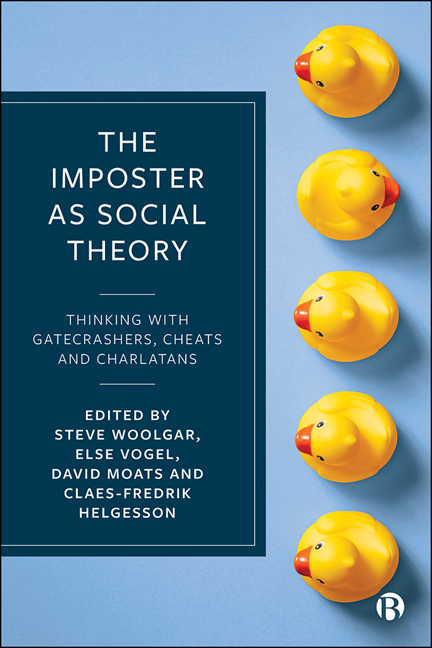Book contents
- Frontmatter
- Contents
- List of Figures and Boxes
- Notes on Contributors
- Preface
- 1 Thinking with Imposters: The Imposter as Analytic
- 2 The Desire to Believe and Belong: Wannabes and Their Audience in a North American Cultural Context
- 3 A Menagerie of Imposters and Truth-Tellers: Diederik Stapel and the Crisis in Psychology
- 4 Learning from Fakes: A Relational Approach
- 5 Imitations of Celebrity
- 6 Natural Imposters? A Cuckoo View of Social Relations
- 7 Conjuring Imposters: The Extraordinary Illusions of Mundanity
- 8 States of Imposture: Scroungerphobia and the Choreography of Suspicion
- 9 The Face of ‘the Other ’: Biometric Facial Recognition, Imposters and the Art of Outplaying Them
- 10 Faking Spirit Possession: Creating ‘Epistemic Murk ’ in Bahian Candomblé
- 11 The Guerrilla’s ID Card: Flatland against Fatland in Colombia
- 12 Good Enough Imposters: The Market for Instagram Followers in Indonesia and Beyond
- 13 Thinking beyond the Imposter: Gatecrashing Un/Welcoming Borders
- 14 Postscript: Thinking with Imposters – What Were They Thinking?
- Index
7 - Conjuring Imposters: The Extraordinary Illusions of Mundanity
Published online by Cambridge University Press: 22 December 2021
- Frontmatter
- Contents
- List of Figures and Boxes
- Notes on Contributors
- Preface
- 1 Thinking with Imposters: The Imposter as Analytic
- 2 The Desire to Believe and Belong: Wannabes and Their Audience in a North American Cultural Context
- 3 A Menagerie of Imposters and Truth-Tellers: Diederik Stapel and the Crisis in Psychology
- 4 Learning from Fakes: A Relational Approach
- 5 Imitations of Celebrity
- 6 Natural Imposters? A Cuckoo View of Social Relations
- 7 Conjuring Imposters: The Extraordinary Illusions of Mundanity
- 8 States of Imposture: Scroungerphobia and the Choreography of Suspicion
- 9 The Face of ‘the Other ’: Biometric Facial Recognition, Imposters and the Art of Outplaying Them
- 10 Faking Spirit Possession: Creating ‘Epistemic Murk ’ in Bahian Candomblé
- 11 The Guerrilla’s ID Card: Flatland against Fatland in Colombia
- 12 Good Enough Imposters: The Market for Instagram Followers in Indonesia and Beyond
- 13 Thinking beyond the Imposter: Gatecrashing Un/Welcoming Borders
- 14 Postscript: Thinking with Imposters – What Were They Thinking?
- Index
Summary
A conjuror … is an actor playing the part of a magician.
(Robert-Houdin, 2011 [1868]: 43)Please, consider if you will the intrigues that the figure of the magician holds for thinking about the imposter. Doubtless you appreciate that entertainment magic (aka ‘modern conjuring’) involves reciprocally recognized and monitored deception. While magicians might proffer all sorts of verbal and non-verbal explanations for their feats, audiences are aware that both can function as techniques of subterfuge. Magicians, in turn, craft their performances by anticipating that many eyes and ears are primed to detect tell-tale signs of chicanery. Robert-Houdin's much-quoted characterization of the conjuror suggests still another level of pretence; while the conjuror takes on the guise of a magician, this semblance is only an outward show that obscures the real role: actor.
In what follows, I want to set the performance of magic and the act of impostering next to each other in order to appreciate how they can mutually inform one another. In doing so, my intent is to examine how imposters and their audiences co-constitute each another. I am going to do so from an unconventional tack. Rather than approaching conjuring from the lofty heights of internationally renowned performers – the David Copperfields, Penn & Tellers, David Blaines and so on of this world – my attention is mainly with the stuttering forays of a beginner with little claim to skill. Namely, me. It is from a position of comparative ignorance and inability that I want to voice certain appreciations about co-constitution.
Motley impostures
Let's start with some basics about persona as this can serve as a portal into many other issues. As part of their performance, conjurors frequently adopt a range of guises. Maybe you have seen one play the part of a psychic, mad scientist, clown, streetwise hustler, psychologist or, perhaps the most devilish of all, ‘themselves’. Each of these guises is able to be enacted in ways more or less suggestive that the performer does (or does not) possess extraordinary abilities. Each persona can also more or less serve as a ruse for dissimulation.
Within the history of magic, an extreme example of impostering was realized by the American performer William Robinson.
- Type
- Chapter
- Information
- The Imposter as Social TheoryThinking with Gatecrashers, Cheats and Charlatans, pp. 147 - 170Publisher: Bristol University PressPrint publication year: 2021



